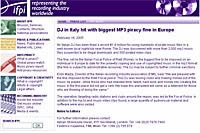 A “well known” Italian DJ could be hit with a record-breaking fine of up to 1.4 million euros ($1.8 million, £968,000) for using thousands of pirate music files in a nightclub near Rome, police said on Wednesday.
A “well known” Italian DJ could be hit with a record-breaking fine of up to 1.4 million euros ($1.8 million, £968,000) for using thousands of pirate music files in a nightclub near Rome, police said on Wednesday.
Police in the town of Rieti, near Rome, said they raided a popular nightclub earlier this week as part of a king-size crackdown on piracy and seized 500 illegally copied music videos and more than 2,000 MP3 music files.
The get-tough operation, targeting radio stations and clubs around the region, was led by the Fiscal Police (Guardia Di Financa, that deal with financial crime), who also seized a large quantity of “audiovisual material” and software.
There are a lot of inaccurate reports floating around about this and we wanted to get the full story, so called up the FIMI in Italy. They told us that the copyright law in Italy dates back to 1941 but was most recently updated a year ago. Under the law the DJ was fined 100 Euro ($130, £69) per copied track, this figure was then doubled to 500,000 Euro. Only if the fine is not paid within 60 days, will it increase to 1.4m.
The reason for the doubling was unclear. Under Italian law, the precise details of the case are not made public until the case comes to court.
The DJ is free to appeal against the fine. Once the fine has been finalised, the money can be paid off monthly.
“For the MP3 files, which were kept on the DJ’s personal computer, the DJ has received a fine of 1.4 million euros,” Rieti finance police said in a statement (the fine is subject to administrative recourse). The DJ may also be subject to further criminal sanctions.
The International Federation of the Phonographic Industry (IFPI) said the fine was the biggest ever slapped on an individual for unlawful music copying and the use of copyrighted music in the MP3 format.
“We are pleased with the fine imposed by the Rieti Fiscal police,” said Director of the Italian Recording Industry Association (FIMI) Enzo Mazza.
He continued, “This deejay was touring clubs and making money out of the music he played – while those who had invested time, talent, hard work and money into creating the music in the first place did not get a cent. We hope this precedent will serve as a deterrent for those who are thinking of doing the same.”
Seeing as venues already pay money to the collection societies for public dance licenses we find the size of this fine a little baffling.
It could certainly be argued that DJs can act as ambassadors for new music (and therefore the music companies) with some high-profile DJs having a considerable influence on the record buying public.
After all, why else would record companies ply DJs with endless vinyl/promos and other inducements in the hope of getting their tunes played?
Perhaps now that times are more lean for the record companies, they’re cutting back on the freebies.
It appears the line between theft and promotion can sometimes be a blurred one, and we’re not convinced that punishing DJs with such enormous fines is the way the record industry should be protecting their sales…
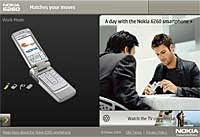 In return Microsoft will also be supporting OMA DRM and AAC music format in their Windows Media player, via a plug in.
In return Microsoft will also be supporting OMA DRM and AAC music format in their Windows Media player, via a plug in.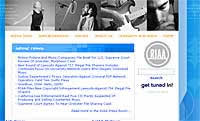 If they weren’t already unpopular enough with a large part of the online music file sharers, the Recording Industry Association of America (RIAA) has managed to score a spectacular PR own goal by suing a dead woman for swapping music files.
If they weren’t already unpopular enough with a large part of the online music file sharers, the Recording Industry Association of America (RIAA) has managed to score a spectacular PR own goal by suing a dead woman for swapping music files.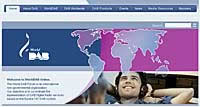 In an announcement apparently penned by a writer playing
In an announcement apparently penned by a writer playing 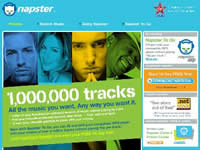
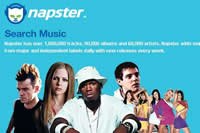 Unlimited music? Over a million tracks? Sounds like the original Napster. Well, there’s the catch. Once you stop shelling out the monthly fee, you’ll be listening to a hard drive full of silence, courtesy of Microsoft’s new Janus digital rights management (DRM) system turning off your access to the tracks.
Unlimited music? Over a million tracks? Sounds like the original Napster. Well, there’s the catch. Once you stop shelling out the monthly fee, you’ll be listening to a hard drive full of silence, courtesy of Microsoft’s new Janus digital rights management (DRM) system turning off your access to the tracks. Michael Robertson, one of the founders of MP3.com, is to return to the world of downloaded music.
Michael Robertson, one of the founders of MP3.com, is to return to the world of downloaded music. Cheaper legal download sites will shake up the online music industry, according to Easyjet founder Stelios Haji-Ioannou.
Cheaper legal download sites will shake up the online music industry, according to Easyjet founder Stelios Haji-Ioannou. It’s worth clarifying that the Internet figures include any listening of the radio on a computer, whether live streaming, using services like the BBC’s RadioPlayer/Listen Again, or Podcasting (download and play).
It’s worth clarifying that the Internet figures include any listening of the radio on a computer, whether live streaming, using services like the BBC’s RadioPlayer/Listen Again, or Podcasting (download and play).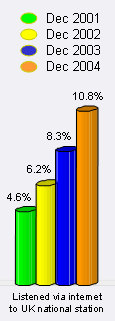 The largest area of growth has been in people listening to UK National radio stations over the Internet. This has increased from 8.3% a year ago to 10.8% of the UK population, equating to just short of 4.8m people. It is thought that this is probably due to an raised awareness that the Internet can be used to listen to the radio, helped in no small part by the BBC pushing the service.
The largest area of growth has been in people listening to UK National radio stations over the Internet. This has increased from 8.3% a year ago to 10.8% of the UK population, equating to just short of 4.8m people. It is thought that this is probably due to an raised awareness that the Internet can be used to listen to the radio, helped in no small part by the BBC pushing the service.
 Few topics are as hot as mobile music right now, with the Midem Mobile Music Forum the place to be on the subject. Panelists touched upon several important areas, with all attempting to understand the future direction of explosive medium. Once again,
Few topics are as hot as mobile music right now, with the Midem Mobile Music Forum the place to be on the subject. Panelists touched upon several important areas, with all attempting to understand the future direction of explosive medium. Once again,  Napster, one of the largest players in music downloads, is considering offering a film download service. The new service would sit alongside its music offering and help to give the company a competitive edge over its rivals. The technology is already in place to download movies, so the same service model could easily apply to films, television programmes and video games, now that broadband connection speeds are getting faster and more prevalent.
Napster, one of the largest players in music downloads, is considering offering a film download service. The new service would sit alongside its music offering and help to give the company a competitive edge over its rivals. The technology is already in place to download movies, so the same service model could easily apply to films, television programmes and video games, now that broadband connection speeds are getting faster and more prevalent.